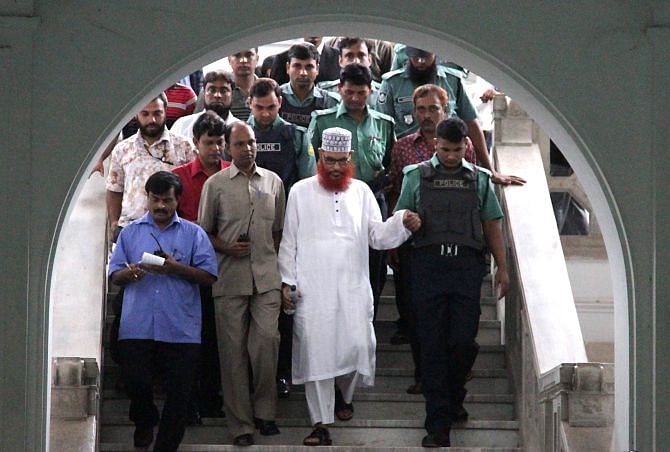Sayedee's virtual reprieve ...
Sayedee's virtual reprieve ...

AS long as you can stay on the hot tin roof as the expression goes, Sayedee may have demonstrated his staying power. It was Alberto Sordi, the Italian film director and actor, who said, "Conscience is the quiet voice that warns you not to leave any fingerprints." But patently unconscionable as they were during our 1971 Liberation War, they left not just footprints but pugmarks. Those were a dark reminder for the posterity of the prowlers and predators who wreaked havoc on the lives of our compatriots.
Remember, the photo-shopped Sayedee image on the moon surface and the Jamaati cult driven carnage taking around 80 lives and maiming many more after the war crimes tribunal had pronounced death penalty against him on February 28 last year. It was a display of the raw power of the evil. Indeed, that terror campaign, though touted as a measure of his influence by his followers added to the heinous crimes against humanity he had been charged with under the War Crimes Trial Act.
The commutation of his sentence has predictably left the victims' families discontented; proponents of the war crimes trial and the people in general were disappointed. Come as it does from the apex court, it has drawn respect from most quarters. Many also expressed reservations about the handling of the case on the government side. Even law minister, the attorney general and the prosecution while expressing their discontent over the outcome showed their deference to the judgment of the highest court. Some blame has been traded between the insiders saying that witness protection was lacking affecting corroboration of circumstantial evidence and that the preparation and presentation of the prosecution case were 'weak'. If that be so, it evidently reflects on the failure of those who steered the case. There is thus a need for introspection and appropriate steps to avert the pitfalls in handling the future war crime trials.
There has been an issue with international standards of the trial for which, of course, we have lately got a cleaner chit from an American legal expert.
At any rate Al Jajeera cited the instance of Shukhranjan Bali, a witness for defense, having apparently been abducted from the gate of the tribunal adding that it 'made the trial controversial'. Sayedee verdict commuting the sentence may have helped remove such a misgiving. The verdict on him has hogged the international media headlines attaching considerable importance to the trial process.
The political fallout of the judgement inside the country will unfold in time, but already there has been a swift silencing of the protest from Gonojagoron Mancha. This platform originally led the movement exerting relentless pressure on the government to hand in maximum punishment to the war criminals. As a result of their constant vigil and pressing of demand, the AL government added a provision to the law whereby both prosecution and defense could appeal the verdict of the tribunal. Earlier, Quader Mollah had been given life-term imprisonment but on a retrial, he was sentenced to death.
The government's gradual distancing from the Gojagoron Mancha which also became divided driving a wedge into its leadership is viewed by many as the ruling party soft-lining its approach to Jamaat to neutralise BNP. There is a surmise that with the passage of the aging Jamaati top leadership, the younger generation would step on to the helm. Consequently, Jamaat may be reformed. The other school of thought furiously contests this view pointing to the rising spectre of theocracy in the Muslim world.
The verdict has set afoot a speculation in certain circles that the ruling party may have been strategically cozying up to Jamaat-e-Islami to offset BNP's capacity for launching a movement. It is pretty much making the rounds that divested of Jamaat-Shibir's spearheading role, BNP's planned agitation against the government will not take off. As if to reinforce this thought, Begum Khaleda Zia herself, when asked about the possibility of rethinking her party's link to Jamaat she hinted at considering it in due course. To add to all this, Tareque Zia said to party followers in London that no political party could be evolved on the basis of religion alone.
It is worthwhile to note that in the local government electoral calculus BNP and Jamaat fought on their own, thereby cutting back on each other's vote banks. In fact, Jamaat emerged with considerable gains in a number of such elections.
Let's not forget, Jamaat's existence as a religious party is under a scanner at the highest judicial level, so that it can't afford to go berserk. Or conversely, it just may when pushed to the wall. Another possibility is for them to reappear under a different label.
For the government's part, it has the compulsion of completing the war crimes trials and handing out the convictions to those found guilty, meeting the standard criteria of justice, sooner rather than later. For given the vagaries of politics, a change of guard could lead to a reversal of the trial results.
The writer is Associate Editor, The Daily Star.
E-mail: husain.imam@thedailystar.net